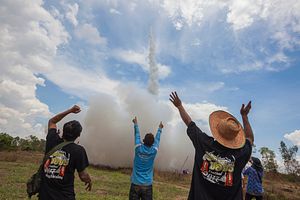YASOTHON, THAILAND — For centuries the people of northeast Thailand, or the Issan region, have conducted Bun Bang Fai rocket ceremonies both to hasten the coming of the rainy season and to earn merit in the Buddhist tradition. The god of rain, Phaya Thaen, and goddess of rice, Phra Mae Phosop, are implored to produce an adequate rainy season and abundant harvest with these festivals. The region’s economy is almost solely reliant on agriculture, with rice as the main crop. Parades and all-night parties precede the launch ceremonies, which in the city of Yasothon take place on the second Sunday of May every year. The Yasothon event, conducted on the Phaya Thaen Park grounds, is widely regarded as the largest bun bang fai festival.
Rockets ranging in size from a few centimeters long all the way to massive missiles of several meters in length constructed in modern times out of plastic PVC pipes are prepared for launch during the festival. They are carefully made by groups from different neighborhoods and villages with much pride being put into the construction of the rockets, or bang fai in Thai. Today there are three size classes of rockets launched at the festival: small “fancy” class rockets, large “sen” (100,000 in Thai) rockets several meters long, and huge “lan” (1,000,000 in Thai) rockets, though the latter are seldom made due to the dangers they pose if detonated prematurely. Though the launching of rockets has in the past resulted in fatal accidents the practice continues, albeit with more concern given to safety.
In addition to having a cultural and religious meaning, the launching of the rockets is also a competition between the various groups who make them. The rockets are launched in pairs, one after another, and judged by the height they reach, the direction they fly, as well as other parameters. The winning teams are awarded prizes ranging from 50,000 Thai baht ($1,450) to 1,000 Thai baht ($29), though a fair amount of betting takes place as well, with much money changing hands after each rocket launch. The losing parties are often seen jumping in ponds of mud, dancing, and drinking their sorrows away after the end of the competition.
Adryel Talamantes is a photojournalist and writer originally from the United States, now based in Bangkok, Thailand. The focus of his coverage centers on current events and cultural interests in Southeast Asia. His work has been published by the Wall Street Journal, USA TODAY, The Diplomat, The Nikkei Asian Review, The Global Post/PRI, War Is Boring, and elsewhere.

















































